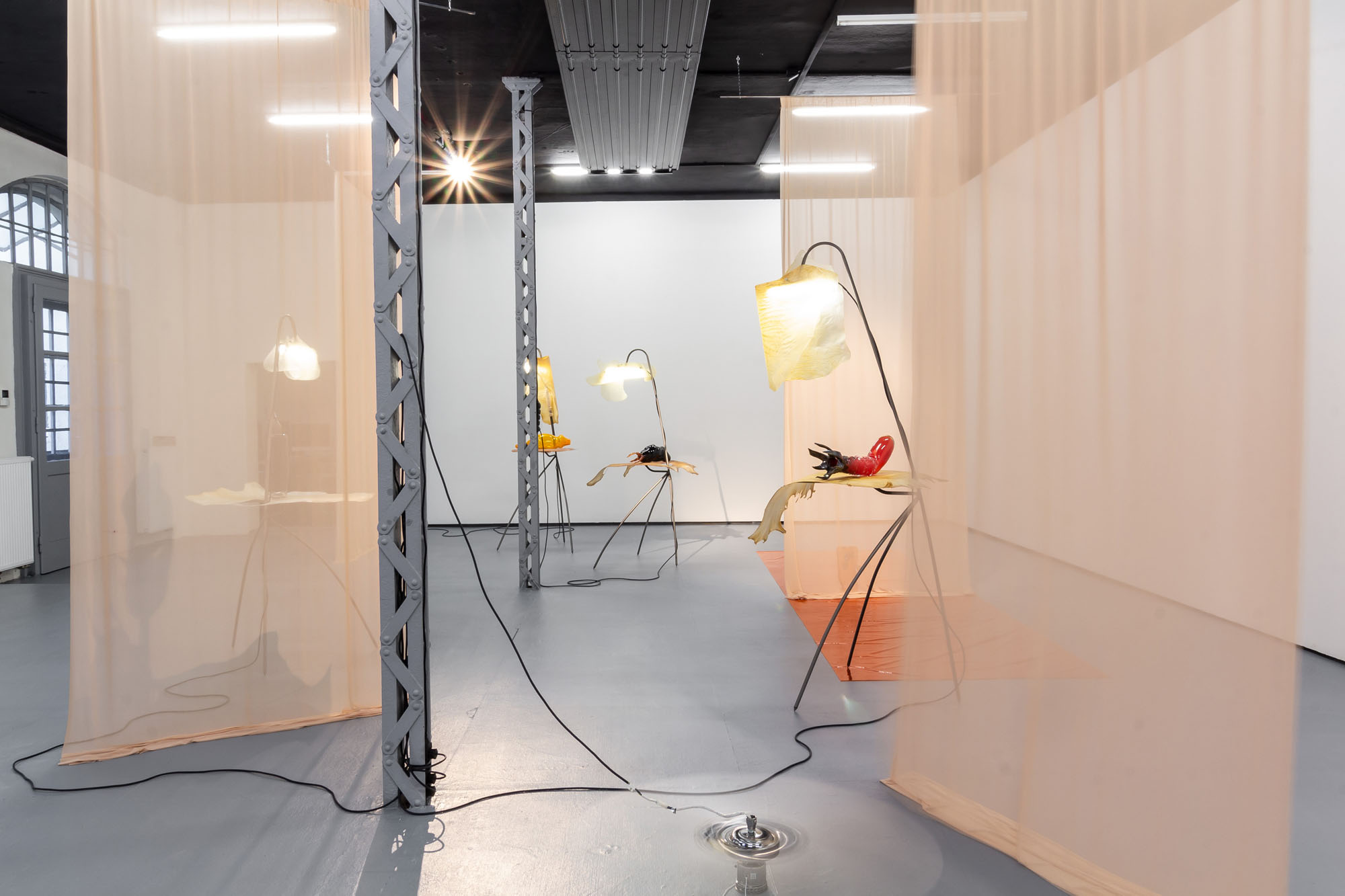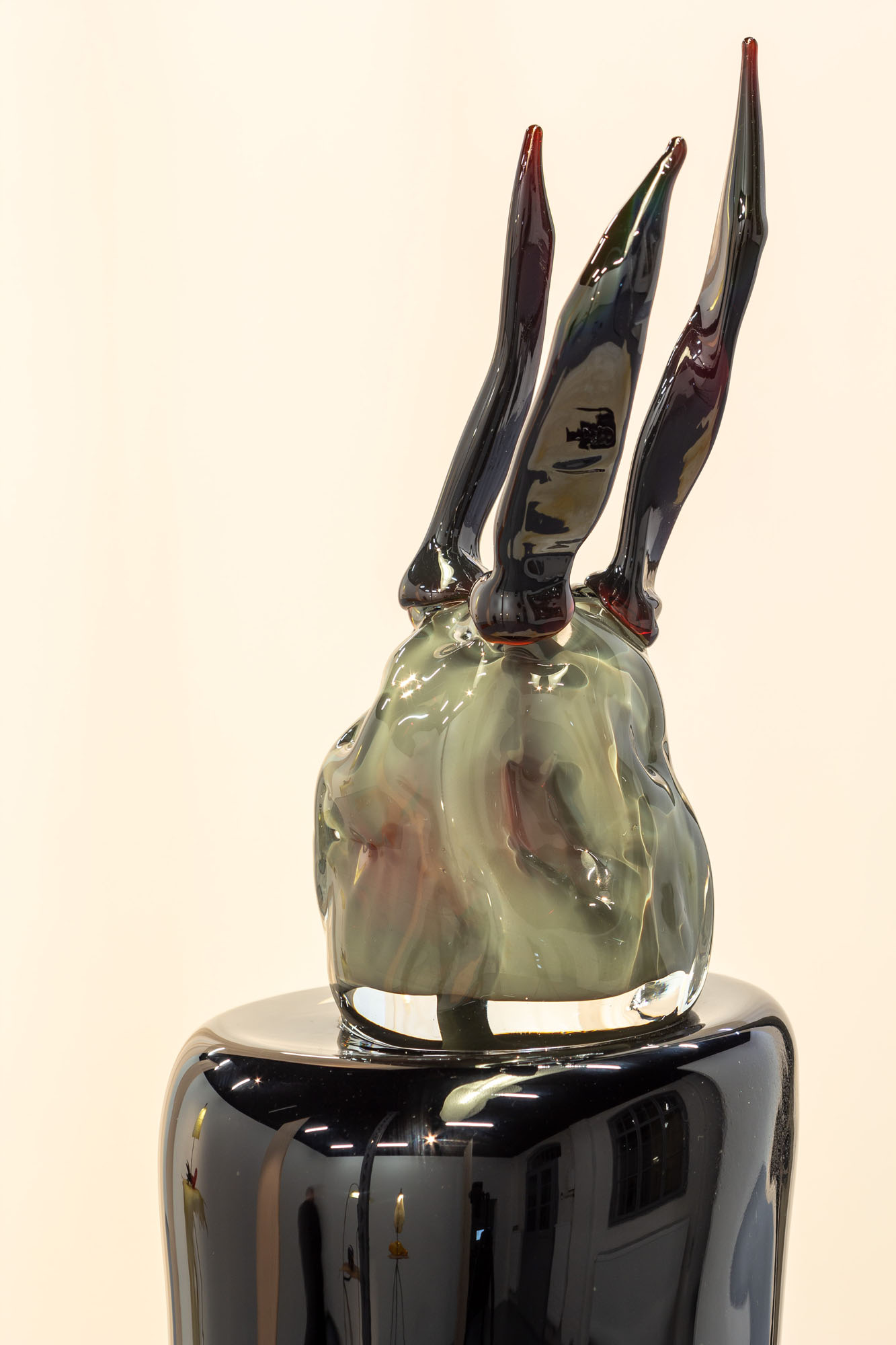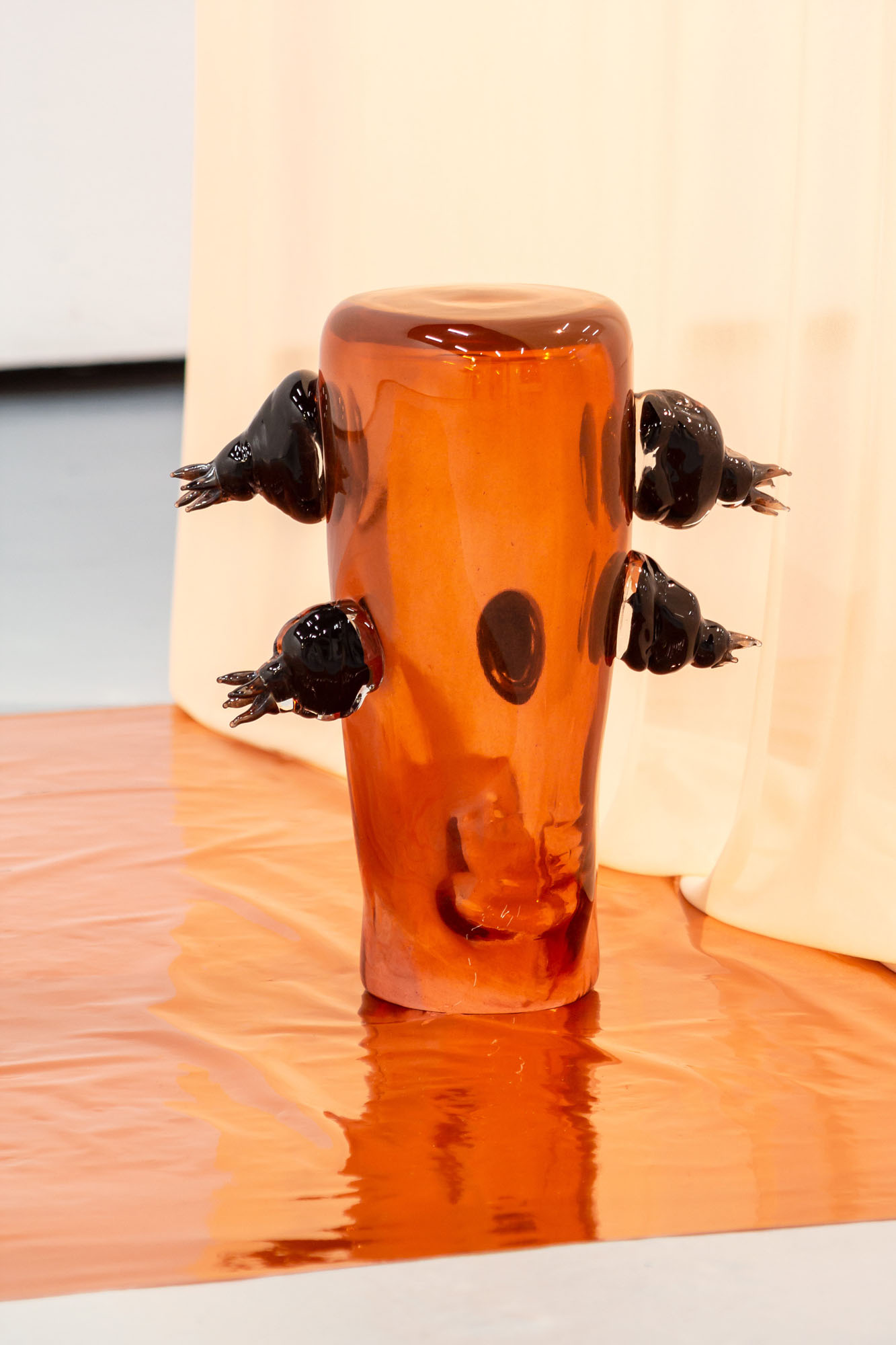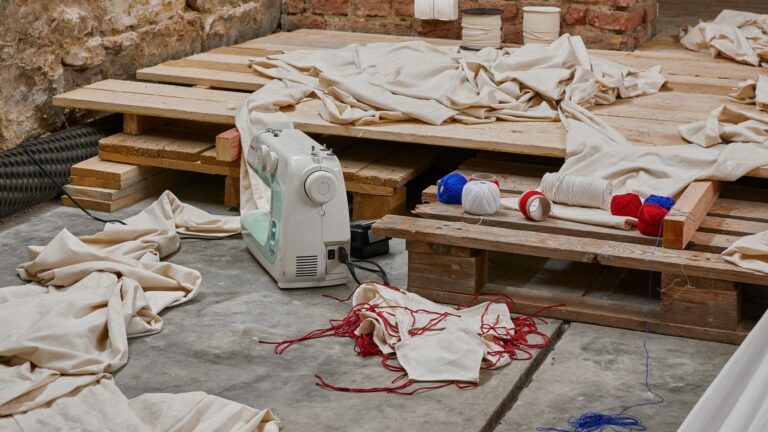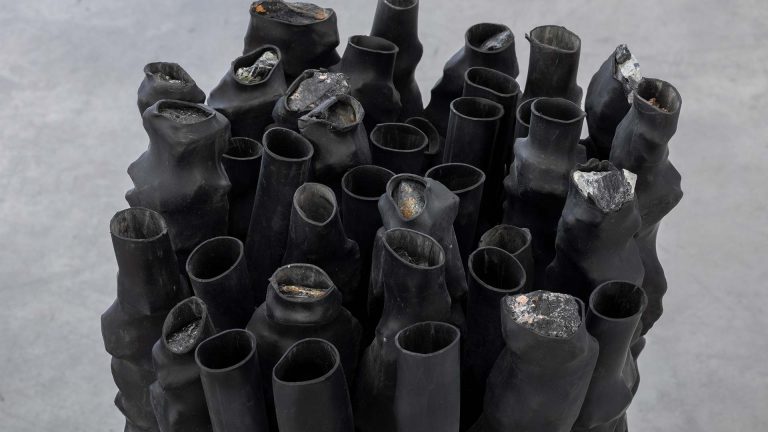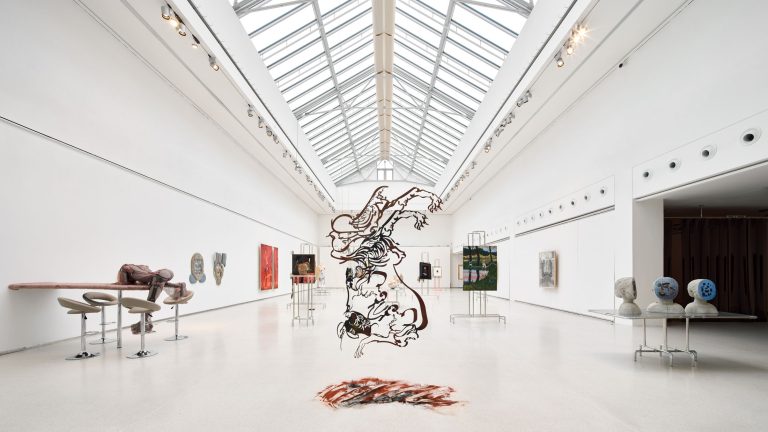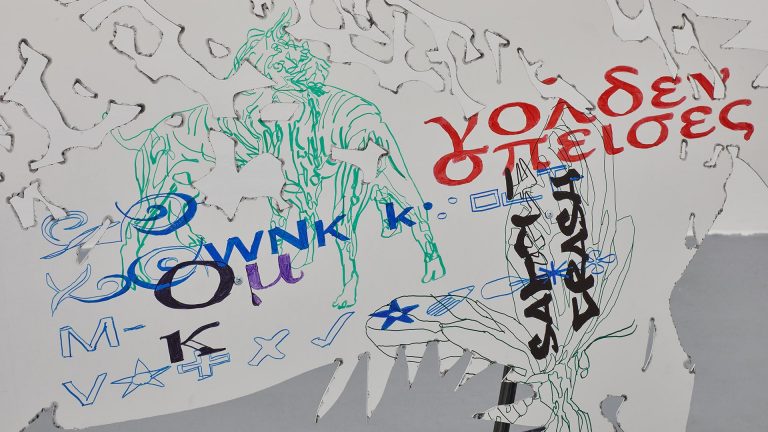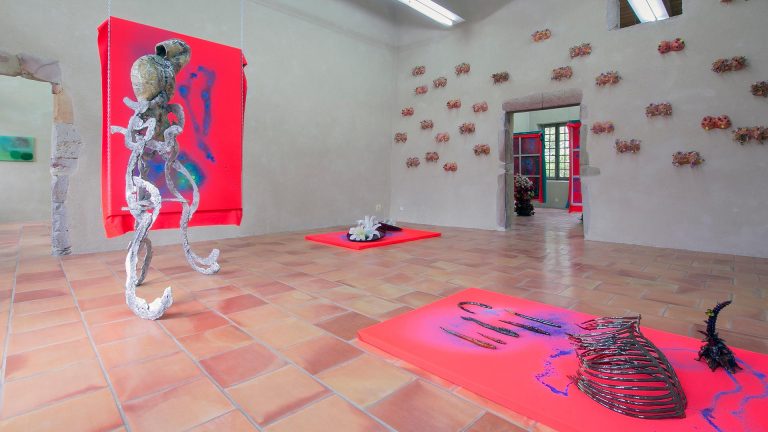Artist: Pakui Hardware
Exhibition title: Thrivers
Venue: Polansky Gallery, Prague, The Czech Republic
Date: November 7, 2019 – January 11, 2020
Photography: Ugnius Gelguda / all images copyright and courtesy of the artist and Polansky Gallery, Prague
Thrivers is the first solo show of Pakui Hardware duo (Neringa Černiauskaitė and Ugnius Gelguda) in Czech Republic. Conceived specially for Polansky gallery space, the installation presents a setting for unresolved figures that merge human limbs with diverse bodies of extremophiles. Thriving under harsh environmental conditions such as extreme cold, heat, acidity or radiation, extremophiles are massaging us for the upcoming future scenarios.
Materials: glass, leather, silicone, chia seeds, metal stands, led lamps, polyurethane filter foam, propeller ceiling ventilator
Upcoming projects include solo exhibition at BALTIC Centre for Contemporary Art, Gateshead (UK), carlier | gebauer, Berlin Leopold-Hoesch-Museum, Düren (DE) as well as group shows at 16th Istanbul Biennial (TR), MO.CO. Montpellier Contemporain (FR).
In 1975, David Cronenberg made a film called Shivers. The story is set on an isolated island and takes place in a luxury apartment complex called Starliner Towers. The self-sufficient building is equipped with all manner of conveniences, including a doctor’s surgery and laboratory where secret research is being conducted. Damaged human organs are being replaced by a parasite which lodges itself in the body and progressively takes over the function of a damaged organ. This alternative organ transplant research is financed by a grant from a private foundation with the strange name The Northern Hemisphere Organ Transplant Society. When the head physician explains the physiological principles behind the functioning of the parasite, his younger associate pauses for a moment in contemplation before pronouncing that it’s crazy. With a cynical smile, the older doctor replies, “It’s crazy, but who cares?” To this day, Cronenberg’s vision of a consumer society ruled by insatiable sexual desire is unsettling. Under a veneer of liberalism, conservative values spread like a parasite through all human orifices, penetrating beneath the skin. When they force their way to the surface as they do in Shivers, they appear in an extreme form. Cronenberg’s parasite looks like a wilted phallus or a slimy blob of excrement. As soon as the parasite enters the host’s body, everything takes on a semblance of normality again. At the moment when everyone in the luxury complex is infected, a certain harmony and calm prevails. They leave the island together under the cover of darkness and drive to the city in expensive cars. The invisible contagion continues to spread. In the 1980s, scientists discovered microorganisms surviving in conditions unsuitable for humans. These resilient forms of life were named extremophiles because of the environments where they occur. People are responsible for the introduction of extreme conditions for life. From the microbial viewpoint, humans are extremophiles, seeking out oxidising environments. Although the Paris Agreement was signed in 2015, no one is observing it today. In a few years’ time, the environment will have changed beyond the point of no return. It’s crazy, but who cares? There is no alternative, but to adapt. If we are unwilling to stop this dangerous transformation of our biotype, we will have to begin to transform the human organism into something more resilient. In view of the fact that extremophiles live in environments that are deadly for humans, most of these organisms are still part of an unexplored dark matter. The application of new scientific knowledge brings new hope for humanity. Or for a select few, to be more precise. A while ago, the US daily The Washington Post added the phrase Democracy Dies in Darkness to its masthead. A dark vision of the present bolstered by metallic Gothic script. The newspaper is owned by Jeff Bezos, the richest man on the planet and the founder of Amazon. The objects exhibited by Pakui Hardware are in a state of disintegration, falling apart into fragments and intermingling in an infinite loop of time that has come to a stop. Transformation is omnipresent, as are bodies without organs. Nothing remains but skin and remnants of bodily tissue. Ovidius and Kafka in a live transmission. It is only logical that the result gives an inhuman impression. Like an artificial intelligence in a cave laboratory trying to generate its own microbes with the aid of information available online. A nebula of artificial fabric engulfs the exhibited sculptures, eliminating the differences between materials. A semi-transparent barrier creates distance and enhances the inaccessibility of the objects on display. At the same time, it divides the space into interior and exterior, thus creating a feeling of intimacy. Fetish as both reward and punishment. We find ourselves in a dead end. A weak laboratory light is shining at the dark end of the blind alley.
Text by Jiří Havlíček




